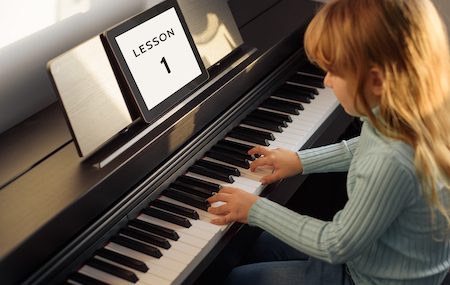Have you decided to give your child the gift of music? Are you looking for a piano to bring into your home for your child to learn on?
Congratulations! Playing the piano is a rewarding hobby that can enrich your life from 1 to 101.
Yet playing the piano isn’t something that happens overnight. It requires a lot of practice to develop the skills necessary to play the songs you love. Yet that’s the fun of it all.
Practicing the piano can be a rewarding experience every time you sit down at the piano … if you plan correctly.
Have the right tools for the job
You wouldn’t practice tennis with a fly swatter. You wouldn’t practice your soccer skills barefoot. Yet what a lot of parents don’t consider when selecting their child’s first piano is that a poor quality piano or keyboard has the same effect.
To create a pleasing sound, you need a piano that is regularly maintained, has a rich, vibrant sound, and plays like a piano should play. Try your skills on a tinny toy piano, and your child will lose interest almost immediately.
Sit correctly
When it comes to playing the piano, one seat can’t cover everything. You can’t pull up the dining room chair and expect it to provide a proper seat.
It also depends on the age and height of your child. Someone who is four feet tall will sit differently at the table than one who is six feet tall. If you get a suitable piano bench, it can adjust to provide proper sitting no matter what size.
Stop labeling the keys
If you look around online, you’ll find sites that allow you to print off labels for the keys. You can place it just above the keyboard, or attach the letters to the keys themselves.
This may seem like a good idea at first, but it can actually weaken practice skills by looking at the letters rather than learning the actual placement of the notes. It’s common to get mixed up in the beginning. That’s what practice is all about.
Reaching for music skills that are too hard
Maybe you have a dream song you’ve wanted to play. You have the music and look at it every day.
But if you attempt to play it before your skills allow you to, you’ll be left with frustration.
Practice improves your technical skills. You’ll get comfortable with playing the more that you play.
If you genuinely have the desire to play a particular piece, let your music teacher know. They might be able to find sheet music to match your ability. At the very least, they can keep it in mind as a goal, and give it to you as a reward when they feel you’re ready.
What tips help you when practicing the piano?


